Publication Charts
Filter by selected classes. Toggle classes on or off to apply filters. Refine your search to just the current active classes. Hover over data points for more info.
These 4 charts (each under a separate tab) have data organized by each class of CCLCM graduates. Each data point represents an individual student.
The charts were created using a home-grown R script that was written by one of our students (Raoul Wadhwa - Class of 2022) and later updated by another student (Sameed Khan - Class of 2027). The script extracts the data from students' Google Scholar profiles. The students are asked to create these profiles and check and update these annually for accuracy. The data is more complete for all students after the class of 2018 and is used to create these interactive charts.
Glossary:
H-index: A scientist has an H-index of h if they have published h papers, each of which has been cited at least h times.
Example:
- If a researcher has 20 papers, and 15 of them have been cited at least 15 times each, their H-index is 15.
- The remaining 5 papers may have fewer citations, but they don’t lower the H-index.
Citations: The total number of times all their papers have been cited in literature.
Charts last updated October 2025.
Research Day
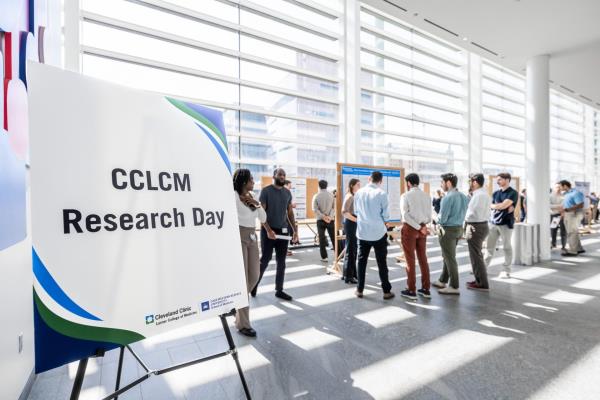
Congratulations to the Cleveland Clinic Lerner College of Medicine Class of 2025 for their outstanding research projects, showcased during the 15th Annual CCLCM Research Day, held on March 14.
Cleveland Clinic vitreoretinal surgeon and uveitis specialist Sumit Sharma, MD (‘09), delivered the keynote address, sharing details about his academic medicine path, academic roles and current research projects. While completing his vitreoretinal surgery fellowship at Duke University, Dr. Sharma was awarded the Heed Fellowship Award and the prestigious Ronald G. Michels Fellowship Foundation Award, given to the top vitreoretinal surgical fellows in the country. In 2016, he joined Cleveland Clinic and currently serves as the Medical Director of the Information Technology Division for Ophthalmology, Uveitis Fellowship Director and medical student clerkship director.
The students’ names, titles of their research work and names of their research mentors are listed below.
Class of 2025 oral research presentations
Helena Baffoe-Bonnie
Evaluation of the hypertension care cascade in South-Central Uganda: A population-based, cross-sectional study of adults
Mentor: Wendy S. Post, MD, MS
Kevin Fung
Pharmacological reduction of mitochondrial oxidative phosphorylation confers protection in a mouse model of ROP
Mentor: Jonathan Sears, MD
Nityam Rathi
Genomic and radiomic characterization of renal tumors in von Hippel-Lindau Syndrome
Mentor: W. Marston Linehan, MD
Chineme (Chichi) Onwubueke
Characterizing the maternal and placental immune response to yellow fever vaccination during pregnancy
Mentor: Suan Sin (Jolin) Foo, PhD
Brady Greene
Thyroid-stimulating hormone as a moderator of ketamine antidepressant and antianhedonic response in treatment-resistant unipolar and bipolar depression
Mentor: Carlos A. Zarate Jr, MD
Rachel Schafer
Influence of multilevel health care factors on patient satisfaction with breast reconstruction post-mastectomy.
Mentor: Graham Schwarz, MD
Class of 2025 mini presentations, abstracts
Madeleine Blazel
Neighborhood disparities in hypertension prevalence and treatment among midlife adults
Mentor: Jarrod Dalton, PhD
Christopher Cantrell
Corneal confocal microscopy as a diagnostic tool for small fiber neuropathy in postural orthostatic tachycardia syndrome (POTS)
Mentor: Robert Wilson, DO
Lydia Cassard
Clinical and histopathologic factors associated with increased risk of malignancy in anti-TIF1-γ positive dermatomyositis
Mentor: Anthony P. Fernandez, MD, PhD
Jamie DeCicco
First histopathologic grading system and clinical outcomes in median arcuate ligament syndrome
Mentor: Kevin El-Hayek, MD, MBA
Radhika Duggal
Endotracheal intubation and upper aerodigestive injury: An assessment of current practice
Mentor: William Tierney, MD
Priya S. Eppel
The effect of immune-mediated inflammatory diseases on the development and progression of age-related macular degeneration
Mentor: Katherine E. Talcott, MD
Jesse Fajnzylber
Utilizing bioinformatic tools to characterize the mutational signatures of bladder cancers in Ohio
Mentor: Timothy Chan, MD, PhD
Ava (Cong) Fan
Matched cohort analysis of ultra-hypofractionated versus standard fractionation preoperative radiation therapy for soft tissue sarcoma
Mentor: Shauna Campbell, DO
Thomas Gautier
Understanding the use of pneumococcal urinary antigen testing in patients with community-acquired pneumonia
Mentor: Abhishek Deshpande, MD, PhD
Jakub Jarmula
Ibudilast and anti-PD-L1 combination treatment significantly improves survival in a sex-dependent manner in a murine model of glioblastoma
Mentor: Pablo Recinos, MD
Julia Joo, MPH
Circadian rhythm disruption in the pathogenesis of optic neuritis associated with multiple sclerosis
Mentor: Sujata Rao, PhD
Jessica MacWilliams
The impact of socioeconomic status on weight-related outcomes and lifestyle behaviors following metabolic and bariatric surgery
Mentor: Leslie Heinberg, PhD
Seth M. Meade
Continuous health assessment in spine surgery leveraging patient-reported outcomes and a novel healthcare utilization metric
Mentor: Ghaith Habboub MD
Jameson Mitchell
Point-of-care echocardiography for the detection of left ventricular remodeling in pregnant patients with chronic hypertension: A prospective cohort study
Mentor: Justin Lappen, MD
Sekinat Mumuney
Approaches for understanding the role of antibody-bound microbes in the female reproductive tract during cervical neoplasia
Mentor: Stephanie Langel, PhD
Monica Nair
Development of ALL-Hematotox (ALL-HT): predicting post-CAR T-cell hematotoxicity in B-cell acute lymphoblastic leukemia (B-ALL)
Mentor: Nirali N. Shah, MD, MHSc
Joe O’Brien
Clinical characteristics, risk factors, and predictive modeling for primary and recurrent Clostridioides difficile infection in the hematopoietic stem cell transplantation population
Mentor: Matthew Pappas, MD, MPH
William Patterson, MPH
Regional analgesia catheter-related infections and the effectiveness of antibiotic prophylaxis in immunocompromised patients: a retrospective multicenter registry analysis
Mentor: Alparslan Turan, MD
Joseph Carter Powers
Exploring the association between rectal cuff inflammation and subsequent structural complications in patients with an ileal pouch-anal anastomosis
Mentor: Taha Qazi, MD
Peyi Runsewe
Novel clinical utility of retinal imaging in heart failure with preserved ejection fraction
Mentor: W. H. Wilson Tang, MD
Saswat Sahoo
Extracellular vesicle biomarkers of Alzheimer’s disease and insulin signaling in prediabetes and type 2 diabetes
Mentor: Dimitrios Kapogiannis, MD
Sokhna O. Seck, MS
Correlates of systemic disease in adult IgA vasculitis: A retrospective study of clinical and laboratory findings
Mentor: Anthony P. Fernandez, MD, PhD
Abigail Snyder
Investigation of aortic behavior as assessed by aortic ultrasound: A prospective study
Mentor: Eric Roselli, MD
Elizabeth Stanley, MPH
Gap in sexual dysfunction management between male and female patients seen in primary care
Mentor: Kathryn Martinez, PhD
Jessica Sterba
Short contact protocols to reduce pain during treatment of actinic keratoses with ALA gel-red light photodynamic therapy
Mentor: Edward Maytin, MD, PhD
Erin Sullivan
Does potassium supplementation reduce the risk of cardiac arrest?
Mentor: Michael Rothberg, MD
Mihika Thapliyal
Preliminary findings of a combined immunotherapy approach to glioblastoma in female mouse models: Anti-IL1ß and CAR T cell therapies
Mentor: Justin Lathia, PhD
We extend our warmest congratulations to the Class of 2025 and their mentors for the time and effort they invested in their outstanding research projects.
Student Research Year Highlights
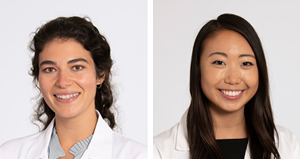
Student Research Year Highlights: Momtazi-Mar and Ouyang
The Cleveland Clinic Lerner of College of Medicine of Case Western Reserve University (CCLCM) is a five-year program dedicated to developing the next generation of physician investigators. During their first year, students are assigned dedicated physician and research advisors to help ensure they reach their educational goals. In their fourth year, students work with a mentor to develop a master’s-level thesis in basic science, translational medicine, clinical medicine or health systems. When the students graduate, they each receive an MD with Special Qualification in Biomedical Research from Case Western Reserve University.
The research in which students are involved is critical, timely and often results in presentations at national conferences and publication in scholarly journals. The examples below briefly describe two students’ research projects, one that involves how socioeconomic factors shape access to male infertility care, and another that involves why Merkel cell carcinoma behaves more aggressively in organ transplant recipients than in patients with normal immune function:
“During my research year, I had the privilege of being mentored by Scott Lundy, MD, PhD, on several projects. My main project looked at how socioeconomic factors shape access to male infertility care, a topic that’s surprisingly overlooked, even though male factors contribute to at least half of infertility cases.
"Using deidentified data from nearly 4,000 men seen at our center, I explored a simple but important question: Does where someone live and the resources in their neighborhood affect how quickly they receive a diagnostic workup and how severe their fertility issues are when they finally get evaluated? What we found was striking. Men from more disadvantaged areas were less likely to be referred for a reproductive urology visit and, even after making it to an appointment, were much less likely to complete a semen analysis, which is the key first step in diagnosing male factor infertility. On top of that, they had worse semen parameters despite being younger and having similar medical histories.
“Altogether, the project highlights how social and structural factors can quietly delay care and worsen outcomes for men, and it underscores the need to address these gaps if we want to reduce long-term reproductive health inequities.”
-Leila (Bushweller) Momtazi-Mar (’26)
“During my research year, I worked with Allison Vidimos, MD, at Cleveland Clinic, and Bryan Carroll, MD, PhD, at University Hospitals Cleveland Medical Center, to investigate why Merkel cell carcinoma (MCC) behaves more aggressively in organ transplant recipients than in patients with normal immune function. MCC is a rare but highly aggressive skin cancer, and transplant patients face an especially elevated risk because the medications that protect their transplanted organ also weaken the immune system’s ability to recognize and eliminate cancer cells. To address our research question, we coordinated a bi-institutional project between two major Cleveland health systems and assembled a robust spatial transcriptomics dataset.
“This project integrated both the clinical characteristics and the molecular architecture of MCC to better understand the drivers of poor outcomes in transplant patients. We first built a unified database of over 300 patients (deidentified), enabling comparisons in diagnosis, treatment patterns and outcomes between transplant recipients and immunocompetent patients. Using spatial transcriptomics, we mapped gene activity within tumor tissue, revealing not just which genes are expressed, but also exactly where critical immune and tumor processes occur. Early results show that transplant-associated tumors exhibit weaker immune activity and more tightly clustered metabolic regions, patterns that may underlie their higher recurrence and mortality rates. By combining advanced spatial biology with real-world clinical data, this project helps us identify the molecular signals and spatial patterns that drive more aggressive disease. Our long-term goal is to use these insights to improve risk prediction and guide more tailored therapeutic strategies for immunosuppressed patients with skin cancer.”
-Kelsey Ouyang (’26)
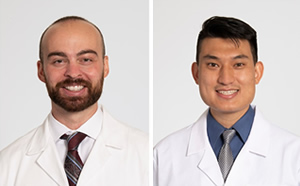
Student Research Year Highlights: Reid and Shu
The research in which students are involved is critical, timely and often results in presentations at national conferences and publication in scholarly journals. The examples below briefly describe two students’ research projects, one that involves transcranial magnetic stimulation, or TMS, and another that involves molecular stool panel testing for patients with infectious diarrhea:
“During my research year, I participated in the National Institutes of Health’s Medical Research Scholars Program, a yearlong experience that immerses medical students in clinical and translational research alongside world-class physician-scientists. I worked in the Noninvasive Neuromodulation Unit at the National Institute of Mental Health (NIMH) under the mentorship of Sarah “Holly” Hollingsworth Lisanby, MD, investigating ways to improve the effectiveness of transcranial magnetic stimulation (TMS), a noninvasive treatment for psychiatric conditions such as major depressive disorder or obsessive-compulsive disorder.
“Though TMS is a great option for individuals who have not responded to other treatments, there is still a subset of people who do not see relief in their symptoms from TMS. Our team focused on answering a key question: Does brain activity at the time of treatment influence someone's response to TMS? To explore this, my study combined TMS with real-time electroencephalography to deliver stimulation at specific phases of an individual's brain rhythm. The study is still ongoing at the NIMH, but preliminary results indicate that brain activity at the time of stimulation does impact response. These findings pave the way for the possibility of more personalized and effective neuromodulation treatments for patients.”
-Conor Reid (’26)
“During my research year, I worked under the mentorship of Abhishek Deshpande, MD, PhD, in the Center for Value-Based Care Research and was supported by a Center for Populations Health Research Fellowship. This experience allowed me to strengthen my data science skills by collaborating closely with talented Quantitative Health Sciences statisticians and researchers who work under Jarrod Dalton, PhD.
“My project focused on identifying which patient populations would most benefit from molecular stool panel testing for infectious diarrhea. Using data from more than 16,500 patients across Cleveland Clinic, we found that pathogen detection patterns varied substantially by underlying health conditions. Transplant recipients were more likely to have viral infections, while patients living with HIV were more likely to have bacterial and parasitic infections. Across all groups, norovirus emerged as one of the most common pathogens detected. Notably, fewer than one in five tests identified a pathogen in high-risk patients, suggesting that more targeted testing could improve diagnostic stewardship while maintaining accuracy. These findings provide important epidemiological insights that can inform clinical decision making, refine testing strategies and advance risk-stratified approaches to improve patient care and reduce healthcare costs. We have been working closely with our clinical microbiology team to translate these findings into an improved stool testing algorithm for our patients.”
-Jeffrey Shu (’26)
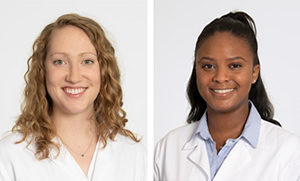
Student Research Year Highlights: Borden and Walker
The research in which students are involved is critical, timely and often results in presentations at national conferences and publication in scholarly journals. The examples below briefly describe two students’ research projects, one that involves using machine learning to maximize benefits of genetic testing for those with chronic kidney disease, and another that involves addressing a gap in care for those with diabetic kidney disease:
"For my master's thesis, I defended a project titled ‘Utilization of Predictive Modeling to Maximize the Benefits of Genetic Testing for Patients with Chronic Kidney Disease.’ Genetic testing is increasingly important to diagnose and manage kidney diseases but remains underused in practice. One barrier is provider uncertainty in determining which patients are likely to benefit from genetic evaluation. To address this barrier, we built a model to classify genetic testing outcomes based on readily available demographic, clinical and laboratory data to serve as a clinical decision support tool.
“Our model was trained on de-identified data from a cohort of about 700 patients evaluated by the Cleveland Clinic Renal Genetics Clinic with completed genetic testing from December 2018 through May 2024. We used machine learning (artificial intelligence) to understand the complex interactions between predictor variables, then explicitly modeled these relationships using interaction terms in a logistic regression framework. More simply put, we used machine learning tools to improve the performance and reliability of our logistic regression model. We were successful in building a model that accurately classifies genetic testing outcomes about 76% of the time (ROC-AUC 0.76). The next step in this project will be to validate model performance in a larger cohort of kidney disease patients not already referred for genetic testing.”
-Chloe Borden (’26)
“During my thesis year, I was awarded a fellowship through the Sarnoff Cardiovascular Research Foundation, which allowed me to conduct research at Emory University School of Medicine. This program is designed to prepare future physician-scientists through hands-on research and mentorship. Under the guidance of Modele Ogunniyi, MD, and Priyathama Vellanki, MD, I focused on improving access and care for patients with diabetes who develop kidney disease. This severe complication affects one in three adults with diabetes, leading to heart-related death and kidney failure. A newer class of medications, called sodium-glucose cotransporter-2 inhibitors (SGLT2i), is protective of both the kidneys and the heart, slowing kidney disease progression and reducing heart-related risk factors; however, they are not being prescribed as often as guidelines recommend.
“To better understand this gap in care, we analyzed one of the largest national datasets to date, including over 1.58 million adults with diabetic kidney disease (DKD), to identify patient-specific demographic and clinical factors that affect SGLT2i prescribing. We found that only half of eligible patients were receiving these guideline-recommended medications. Prescribing patterns were multifaceted, with differences based on age, sex, insurance status, race and even neighborhood-level social factors (e.g., economic stability and community resources), which influenced prescription status. My research highlights key opportunities to improve care for patients who would benefit from these life-sustaining medications. To optimize the equitable implementation of these therapies across the DKD population, targeted interventions addressing policy barriers, healthcare infrastructure, provider education and social support services are urgently needed.”
-Claudia Walker (’26)
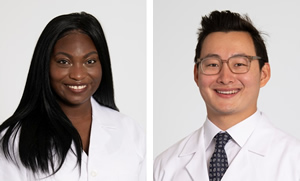
Student Research Year Highlights: Oladeji and Shen
The Cleveland Clinic Lerner of College of Medicine of Case Western Reserve University (CCLCM) is a five-year program dedicated to developing the next generation of physician investigators. Students are assigned dedicated physician and research advisors to help ensure they reach their goals. In their fourth year, students work with a mentor to develop a master’s-level thesis in basic science, translational medicine, clinical medicine or health systems. When the students graduate, they each receive an MD with Special Qualification in Biomedical Research from Case Western Reserve University.
The research in which students are involved is critical, timely and often results in presentations at national conferences and publication in scholarly journals. The examples below briefly describe two students’ research projects, one that involves efficacy of treatments for polycystic ovary syndrome, and another that involves testing the use of vitamin D to improve the effectiveness of photodynamic therapy for non-melanoma skin cancers:
“My clinical research project is titled ‘The Efficacy of Glucagon Like Peptide-1 Receptor Agonists (GLP-1RA) versus Metformin in Polycystic Ovary Syndrome (PCOS) Management,’ and my research mentor is Mindy Christianson, MD. My research focused on patients diagnosed with polycystic ovary syndrome (PCOS) from 2020 to 2024 who were treated with glucagon-like peptide-1 receptor agonists (GLP-1RAs), metformin or both. The primary outcome is a change in BMI to assess if the use of GLP-1RA compared to metformin leads to increased weight loss in patients with PCOS. A significant secondary outcome is whether use of GLP-1RA, because of this weight loss, leads to restoration of ovulatory function more frequently than metformin use alone. Results so far have demonstrated that the use of GLP-1RAs are by far superior to metformin in promoting weight loss in this population, when controlling for possible confounders such as age, hemoglobin A1c and more.”
-Temi Oladeji (’26)
“During our research year, I studied new ways to improve treatment for non-melanoma skin cancers, the most common cancers in the world. These cancers often develop a tumor environment that blocks the body’s natural ability to clear them through the immune system, which can make them more persistent. The research team and I focused on using photodynamic therapy (PDT), a light-based treatment that destroys cancer cells and can also stimulate immune responses, but which sometimes works less well on thicker or more aggressive tumors. Our project explored whether vitamin D could be used to boost PDT’s effectiveness. In experiments, we found that vitamin D not only increased the number of immune cells entering tumors but also strengthened their ability to attack cancer cells, possibly allowing for more complete tumor destruction. We also examined human skin cancer samples and discovered that more aggressive tumor types had stronger immune-suppressing features, which may explain why they are harder to treat. Building on these findings, we have designed a clinical trial to test whether adding vitamin D can improve PDT treatment efficacy for patients with non-melanoma skin cancer. Altogether, this work suggests that vitamin D may be a safe and effective way to enhance PDT and improve clearance rates for these patients.”
-Alan Shen (’26)
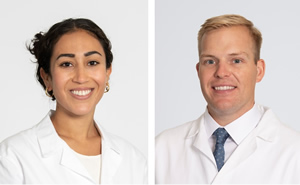
Student Research Year Highlights: Arakelian and Ramos
The research in which students are involved is critical, timely and often results in presentations at national conferences and publication in scholarly journals. The examples below briefly describe two students’ research projects, one that involves using ketamine to treat concurrent pain and depression, and another that evaluates the performance of a specialized implant in revision total hip arthroplasty, the findings for which were accepted as a podium presentation at the American Association of Hip and Knee Surgeons 2025 Annual Meeting:
“During my research year, I participated in the National Institute of Health's (NIH) Medical Scholars Research Program, a yearlong immersion program that brings medical students to the NIH and supports their professional development into physician-scientists. As part of this, I joined the laboratory of Carlos Zarate, MD, who is the current chief of the Experimental Therapeutics and Pathophysiology Branch at the National Institute of Mental Health (NIMH). Dr. Zarate's group is interested in novel therapeutics that will change how we practice psychiatry. One such therapeutic, and a major part of Dr. Zarate's work, is ketamine. Ketamine was traditionally thought of as an anesthetic, but over the past 20 years it has been recognized for having antidepressant effects as well. Ketamine is particularly exciting as a potential treatment because it has rapid onset (unlike traditional antidepressants) and may offer an alternative to patients who are otherwise resistant to traditional depression treatments.
“Because ketamine is used to treat both pain and depression, I wanted to explore whether patients who had concurrent pain and depression were more likely to benefit from ketamine treatment than those without pain. If patients with pain are, in layman's terms, "super-responders" to ketamine, that would help us better understand how the pathophysiology of pain and depression intersect, and it may provide us with a potent treatment for patients who are historically very hard to treat. My findings indicate that body mass index interacts with pain and ketamine treatment through a mechanism we don't yet understand.”
-Miranda Arakelian (’26)
“Revision total hip arthroplasty (rTHA) is a complex reconstructive procedure performed when a patient’s primary total hip arthroplasty fails. Due to the reconstructive challenges involved in rTHA, the use of specialized implants, including modular fluted tapered (MFT) femoral stems, has gained popularity over the past two decades. These stems provide several advantages in restoring joint mechanics and leg length, leading to improved patient outcomes. However, studies on these stems have been limited by small sample sizes and a lack of radiographic analysis.
“Our study evaluated the performance of MFT stems in aseptic rTHA, focusing on the incidences of reoperation, re-revision and stem subsidence, or loosening over time, and factors associated with these outcomes. The retrospective cohort study included 316 patients who underwent rTHA with MFT stems between 2015 and 2024. Over a 10-year follow-up period, 16.5% of patients underwent reoperation, while 10.1% required re-revision. Radiographic analysis showed that clinically significant stem subsidence occurred in 16% of cases. Additionally, we identified several factors linked to repeat surgeries and stem subsidence. Increasing age was associated with a lower risk of reoperation, while higher BMI was linked to increased risks of reoperation, re-revision and stem subsidence. No radiographic measurement was ultimately associated with any of the outcomes investigated. The results suggest that a femoral stem canal fill of at least 78% is sufficient to prevent reoperation, re-revision and stem subsidence, effectively establishing a threshold of canal fill that surgeons should aim for during aseptic rTHA. Further, younger patients and those with higher BMIs may require additional early follow-up visits or more cautious return to weight-bearing after surgery to reduce the chances of reoperation and stem loosening.”
-Michael Ramos (’26)
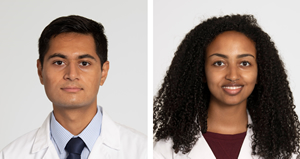
Student Research Year Highlights: Pramod and Sharew
The Cleveland Clinic Lerner of College of Medicine of Case Western Reserve University (CCLCM) is a five-year program dedicated to developing the next generation of physician investigators. Students are assigned dedicated physician and research advisors to help ensure they reach their goals. In their fourth year, students work with a mentor to develop a master’s-level thesis in basic science, translational medicine, clinical medicine or health systems. When the students graduate, they each receive an MD with Special Qualification in Biomedical Research from Case Western Reserve University.
The research in which students are involved is critical, timely and often results in presentations at national conferences and publication in scholarly journals. The examples below briefly describe two students’ research projects, one that involves using advanced screening techniques to find prostate cancer and another that examines the prevalence of arrhythmic mitral valve prolapse after valve repair:
“During my research year at the National Institutes of Health, I studied how advanced imaging can better detect aggressive localized prostate cancer. Specifically, I worked with a specialized scan called PSMA PET/CT, which targets a protein commonly found elevated on prostate cancer cells. While this imaging tool has transformed how we find and stage prostate cancer, we still don’t fully understand why some tumors show up brightly on these scans and others don’t. To investigate this, we analyzed tumor samples from patients who had surgery for high-risk prostate cancer. Using a combination of immunohistochemistry (a method to visualize proteins in tissue), whole exome sequencing (to examine mutations in the DNA) and RNA sequencing (to study gene activity), we looked for molecular patterns linked to high uptake on the PET scans. We also tracked clinical outcomes like cancer recurrence after surgery. Our goal was to identify features of the tumor that could predict both imaging behavior and disease aggressiveness, helping personalize treatment decisions for future patients. This experience solidified my interest in academic urology and gave me hands-on training in translational research that bridges laboratory science with patient care.”
-Nikhil Pramod (’26)
“During my research year at Cedars-Sinai Medical Center as a Sarnoff Cardiovascular Disease Fellow, I led a project focused on arrhythmic mitral valve prolapse. In approximately one-third of patients, mitral valve prolapse is associated with ventricular arrhythmias, which can result in adverse outcomes, including sudden cardiac death. My work explored the prevalence and prognostic impact of arrhythmic mitral valve prolapse in patients undergoing either surgical or transcatheter mitral valve repair. In a national cohort, we found that patients with arrhythmic mitral valve prolapse who underwent surgical repair had survival outcomes comparable to those without arrhythmias. Similarly, in an institutional cohort using long-term rhythm monitoring, the incidence of ventricular arrhythmias after surgical repair was not significantly different between groups. However, following transcatheter edge-to-edge repair, patients with arrhythmic mitral valve prolapse experienced worse survival and a higher risk of ventricular arrhythmias compared to their non-arrhythmic counterparts. The lab I worked with is currently enrolling patients in a multicenter randomized controlled trial to compare outcomes after surgical versus transcatheter repair in patients with mitral valve prolapse. We plan to use detailed imaging and prospective electrocardiographic data from this trial to further investigate the pathophysiologic impact of valve repair on arrhythmias.”
-Betemariam Sharew (’26)

Student Research Year Highlights: Onwubueke and Schafer
The research in which students are involved is critical, timely and often results in presentations at national conferences and publication in scholarly journals. The examples below briefly describe two students’ research projects, one that involves effective yellow fever disease prevention in pregnant populations and another that involves equitable access to breast reconstruction following mastectomy:
My research, conducted in the lab of Suan Sin Foo, PhD, focused on investigating the maternal and placental immune response to the YFV-17D yellow fever vaccine. With changing climates, mosquito-borne diseases like yellow fever are becoming more of a global issue. The yellow fever vaccine is an excellent way to protect people from infection, morbidity and death. The vaccine, however, is live-attenuated, meaning populations including pregnant women are currently recommended against receiving it. Our research team sought to investigate how the maternal and placental immune system respond to vaccination. We did in vitro experiments on human villous trophoblasts (HVTs) and ex vivo experiments on whole blood obtained from both non-pregnant women and women in different trimesters of pregnancy.
Our results showed that HVTs are highly susceptible to infection from the YFV-17D live-attenuated yellow fever vaccine. When exposed to the vaccine, HVTs exhibited a robust inflammatory response that reduced growth factor and angiogenic expression. Additionally, we observed activation of immune cells called monocytes in the second and third trimester of pregnancy. We therefore concluded that the YFV-17D vaccine may be associated with negative pregnancy outcomes during the second and third trimesters. I hope that this research can be useful in paving the way to safe, effective yellow fever disease prevention in pregnant populations.”
-Chineme Onwubueke (’25 )
For my research thesis, I worked with Graham Schwarz, MD, and my research committee to examine how the Affordable Care Act (ACA) has impacted access to breast reconstruction after undergoing mastectomy. Using data from the National Surgical Qualitative Improvement Project, we analyzed over 200,000 patients to uncover persistent racial disparities in reconstruction access before the ACA passed. After the passage of the ACA, we still saw persistent racial disparities, but we also saw improvements in some areas.
One thing we found is that Hispanic women are now more likely to undergo breast reconstruction compared to their non-Hispanic counterparts. This demonstrates that while racial barriers still exist, it is possible to make breast reconstruction access more equitable in the United States. I think every single person deserves to be able to have breast reconstruction surgery if they choose. Reconstruction can have a huge impact on quality of life for mastectomy patients, yet right now we're seeing that some groups can access it more than others. Our analysis will hopefully lead to more targeted initiatives exploring how to increase access so that we as a medical community can advocate for meaningful change.”
-Rachel Schafer (’25)
Student Stories - Awards
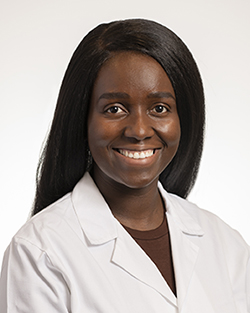
Akua Abrah receives Fulbright U.S. Student Award for 2025-26
Akua Abrah (’27) received a Fulbright U.S. Student Program award from the U.S. Department of State and the Fulbright Foreign Scholarship Board to conduct public health research in Ghana for the 2025-26 academic year. Abrah’s Fulbright research involves a screening study of glucose-6-phosphate dehydrogenase (G6PD) deficiency among newborns at Suntreso Government Hospital in Kumasi, Ghana. G6PD deficiency increases the risk of severe hyperbilirubinemia, which can lead to kernicterus, a leading cause of neonatal mortality in Ghana. In partnership with the Northern Pacific Global Health Research Fellows Training Consortium, Abrah will not only assess its incidence and correlation with neonatal jaundice but also evaluate the feasibility and cost-effectiveness of integrating G6PD screening into routine newborn care. Her work aims to reduce preventable neonatal complications in resource-limited settings and lay the groundwork for future collaboration and capacity building in neonatology in Ghana. Learn more about Abrah’s work in this interview.

Student wins CLEsog Award
Congratulations to Jameson Mitchell (’25) on receiving the 2024 Cleveland Society of Obstetricians and Gynecologists (CLEsog) Medical Student Award. This honor, accompanied by a cash prize, is presented annually to one exceptional graduating medical student from Case Western Reserve University School of Medicine, Cleveland Clinic Lerner College of Medicine or Northeast Ohio Medical University who is pursuing a career in obstetrics and gynecology. The CLEsog executive committee selects the recipient based on outstanding dedication to women’s health and strong potential for a successful career in the field.

Chichi Onwubueke wins Alumni Association Award
Congratulations to Chineme “Chichi” Onwubueke (’25) for winning the 2025 Alfred and Norma Stoller Award for Virtue-Based Leadership in Medical School. The purpose of the award is to support recipients who exemplify and drive one or more of the seven classic virtues: trust, compassion, hope, justice, wisdom, temperance and courage. In addition to her cash award, Chichi received a signed copy of the book, "Better Humans, Better Performance: Driving Leadership, Teamwork, and Culture with Intentionality" by Peter Rea, James Stoller and Alan Kolp. Chichi will be acknowledged in the spring issue of the Cleveland Clinic Alumni Connection newsletter and will be presented with her award during the annual spring reception.
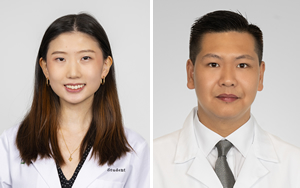
Students earn Research Day recognition
Congratulations to Elaine Cheng (‘29), who was named among the Outstanding Student Presenters, and Ryan Song (‘28), who was selected for an oral presentation at the second annual Case Western Reserve University School of Medicine Graduate and Medical Student Research Day, Oct. 22, 2024.
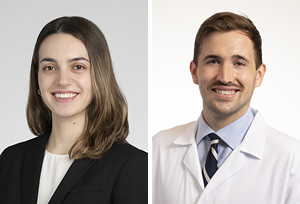
Two students recognized for their research
Congratulations to Madeleine Blazel (‘25), who is among the winners of the 2024 F. Merlin Bumpus Junior Investigator Award. She placed second for her research project titled “Deconstructing disparities in hypertension prevalence by neighborhood socioeconomic position and racial composition.” Madeleine has been conducting her research in the Jarrod Dalton Lab.
Congratulations also to R. Sky Jones (‘27), who is among the finalists of the 2024 Bumpus Junior Investigator Award for his project titled “MR fingerprinting predicts gait improvement following lumbar CSF drainage in normal pressure hydrocephalus.” Sky’s sponsor is Stephen E. Jones, MD, PhD.
The Bumpus Award winners and finalists were announced at the 44th Annual Cleveland Clinic Research Day. The F. Merlin Bumpus Junior Investigator Award was created to highlight excellence in research by graduate students and postdoctoral fellows in both basic and clinical research. The award is named after F. Merlin Bumpus, PhD, who served as Chair of Research at Cleveland Clinic from 1966 to 1985.
CCLCM celebrates research awardees
For academic year 2024-25, we celebrate the 10 fourth-year students who received away-fellowship research awards. Notably, all the students who applied for these awards received them.
National Institutes of Health
- Miranda Arakelian
- August Culbert
- Roshan Lodha
- Nikhil Pramod
- Coner Reid
- Victoria Rogness
Sarnoff Fellowship Award
- Meghana Iyer
- Betemariam Sharew
- Claudia Walker
Okinawa Institute of Science and Technology Graduate University, Japan
- Maria Gorenflo
Madeleine Blazel wins Crain Research Award
Congratulations to Madeleine Blazel (‘25) who received the competitive 2024 Lawrence "Chris" Crain Research Award for her research titled “Neighborhood-level disparities in hypertension prevalence and treatment among midlife adults.” Madeleine received her award at the Cleveland Clinic Internal Medicine Grand Rounds on Aug. 22. The Crain Award comes with a cash honorarium. Lawrence “Chris” Crain was Cleveland Clinic’s first African-American chief resident in internal medicine. After completing a nephrology fellowship at Cleveland Clinic, he established a clinical practice focused on hypertension and renal disease, particularly in patients with a range of experience and needs. Dr. Crain died suddenly in 2003 at the age of 38. Learn more about Dr. Crain and contribute to the Lawrence “Chris” Crain Memorial Fund, which helps to fund this annual research award.
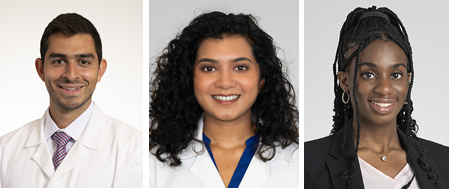
Three students receive “Compassion and Valuing Every Person” award
Congratulations to Eliot Haddad (’27), Shivani Nellore (’28) and Chichi Onwubueke (’25) who received a 2024 “Compassion and Valuing Every Person” award for their reflections regarding actions of compassion or actions that demonstrate the valuing of a person in healthcare. Eliot received an award for his story “From Error to Asset: A Med Student’s Role in the Healthcare Team.” Shivani received an award for her artwork titled “Who gets the heart? Life beyond numbers,” a reflection about organ transplantation. Chichi’s reflection, titled “To Know or Not to Know?” received a special recognition award.
Student Stories - Grants
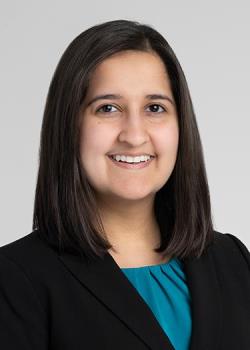
Radhika Duggal earns two research grants from national society
Kudos to Radhika Duggal (‘25) who earned two grants in 2024 from the American Head and Neck Society. Radhika received an AHNS Pilot Grant for her research titled “Targeting E6/E7 in HPV+ oropharyngeal cancer with therapeutic RNA nanovaccines” and the Thyroid Cancer Survivors’ Association Award for Thyroid Cancer Research Grant for her research titled “Therapeutic personalized RNA-LPs for dab/tram-tolerant anaplastic thyroid cancer.” Her findings will directly inform a human clinical trial at Cleveland Clinic investigating the application of RNA nanovaccines for head and neck cancers.

Brianna Matthew on her Mission: Nutrition
Brianna Matthew, a second-year student at the Cleveland Clinic Lerner College of Medicine (CCLCM), has always had a passion for nutrition. Thanks to a Cleveland Clinic Catalyst Grant for her project "Enhancing Nutrition Literacy in Medical Education: The CCLCM Medicine Initiative for Hypertension," she is now working with mentors and peers to educate a group of hypertensive Clevelanders about maintaining a healthy diet. Matthew discusses her unique background, the importance of health education and plans for her new initiative below.
How did you end up at CCLCM?
I was born and grew up in the U.S. Virgin Islands. After getting my bachelor’s degree in biomedical engineering from the Florida Institute of Technology, I knew I wanted to pursue a career in medicine. CCLCM stood out to me from the very first time I visited it on interview day. Everyone was so warm and welcoming, and I felt a really strong sense of community among the students. As a first-generation student, it was important to me to enter a supportive environment welcoming to everyone. I couldn’t be happier with my decision to come to CCLCM.
You have a unique background. How has it influenced your passion for nutrition?
Cooking played a big role in my childhood. Some of my favorite memories are of me cooking with my mom. In the Caribbean, dietary habits often include significant amounts of meat, rice and flour-based foods. My father has diabetes, and it’s always been a struggle to get him to eat healthier. I started thinking about how I could use my love of cooking and my medical knowledge to help people of all backgrounds make more nutritious dietary choices. My mission is to meet communities where they are. Healthy eating doesn’t have to get in the way of celebrating culture through food. I want to help people adapt the foods they already cherish into more nutritious meals.
You recently won a Cleveland Clinic Catalyst Grant for a nutrition literacy project proposal – congratulations! Tell us about the project.
This is a project that’s meant to address knowledge deficits within both patient and physician communities. Medical school does an excellent job of providing foundational scientific knowledge behind different pathologies and diseases. What I found in practice though is that I couldn’t take the medicine behind nutrition and effectively apply it when discussing dietary planning with patients. Patients with hypertension and diabetes would often mention their struggles with maintaining a healthy diet, and I wouldn’t know how to help them. That’s when my colleagues and I decided that we wanted to create an initiative incorporating nutrition education into the medical curriculum.
The Catalyst Grant covers 20 hypertension patients and 20 medical students to participate side-by-side in nutrition education activities. These include three cooking sessions led by a professional chef -- during which participants will learn how to make healthier alternatives to some of their favorite foods -- as well as a grocery store immersion session where a registered dietitian will teach participants to read nutritional labels and pick ingredients. Since this is a pilot program, participants will complete pre- and post-activity surveys to provide feedback.
It's unique to see programs where medical students and patients are learning together. Why is that so important?
For medical students to effectively engage with patients about nutrition, they must first understand the challenges of diet adherence from the perspective of patients. This program gives medical students the opportunity to cook healthy alternative dishes and learn shopping techniques themselves so that when they work in the clinic, they can relate to patients’ experiences. It also allows students to get comfortable working interprofessionally with dietitians. By including patients in the program, we aim to teach healthy habits, create a supportive environment and gain insight into their cultural relationships with food. We hope to eventually host patients with diseases other than hypertension to gain an even broader understanding of patients’ relationship to nutrition.
You mentioned earlier that your father inspired your passion for nutrition. What does he think about this project?
He’s really excited about it! My dad wants me to come and teach him the techniques we learn in our sessions once the pilot program is over. I can’t wait to share my new knowledge with my family back home.
Student Spotlight and Kudos
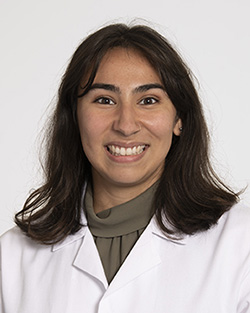
Student Spotlight: Martina (Marti) Hale
Tell us briefly about yourself.
I grew up in Chicago, got my undergraduate degree in chemistry from Princeton University, New Jersey, and then moved across the country to San Francisco to start a two-year research fellowship at the University of California, doing CAR-T and other immunologic development for hematologic malignancies. I quickly fell in love with the San Francisco food scene, hiking and weekend runs across the Golden Gate Bridge.
Now I’m happy to be back in the Midwest and at CCLCM, where I’ve found some incredible friends, mentors and colleagues. Soon I’ll be applying for an orthopaedic surgery residency.
Why did you choose CCLCM?
I had been deciding between an MD/PhD and MD track, and my decision to possibly pursue a surgical specialty pushed me toward the MD track. Because I wanted research to feature prominently in my medical education and future career, I sought out schools that heavily incorporated research into the curricula. At CCLCM, the built-in research thesis and grades-free philosophy — this allows students to more freely pursue research opportunities — stood out to me. I knew this would be a place I’d be both lucky and happy to attend.
What is one of your favorite experiences at CCLCM thus far?
One of my favorite memories was serving as an orientation leader for the incoming medical school class. It was so fun to work with my closest friends to plan scavenger hunts, ice breakers and AMAs [Ask Me Anythings] for the new students to learn more about the program and their classmates.
Tell us about your research year project.
I am very passionate about expanding female visibility in orthopaedic literature. For a long time, it was believed that whatever research was conducted on males would transfer to females, but that simply isn’t the case. I wanted my thesis to focus on understanding where female athletes differ from their male counterparts after anterior cruciate ligament (ACL) reconstruction (ACLR) and figuring out why these differences exist.
In previous research, I found that female sex was repeatedly correlated with lower activity scores at 2, 6 and 10 postoperative years. My thesis focused on generating a causative model to investigate females’ lower activity levels at two years after ACLR. We conceptualized a hypothetical randomized control trial in which male and female participants were separated into two study arms based on sex, randomized to different combinations of sport and ACL graft type, and were followed over two years to assess their activity level. We found that for males and females, graft choice and sport did not cause differences in activity levels in either males or females.
How do you manage stress?
Usually, if I’m feeling overwhelmed, I’ll try to fit in a quick run or lift at the gym. If the stress hits after a long day in clinic or the OR and there’s not enough energy left for a full workout session, I’ll bake cookies or cuddle up on the couch with my Bernese Mountain Dog, Sully, and distract myself with a rom-com movie.
What advice would you give to new CCLCM students?
Take your time finding yourself a mentor; the first physician you work with doesn’t have to be the one you stay with. I think we’re eager to join a big lab when we first start out so we can get some exposure to what’s out there. This can be a rewarding strategy, but you can always cold email people whose research sounds up your alley, even if they haven’t worked with medical students before. Some of my strongest relationships were built with physicians I emailed and were relatively new to mentoring students. I have found that this can provide two things: more freedom in deciding what research you’d like to work on and more individualized time with mentors.
How do you fill your spare time?
I enjoy training for triathlons, hosting dinner parties for my friends, reading pieces on food journalism and walking Sully through the Metroparks.
Tell us a fun fact about yourself.
I worked as sales rep, fitting people for running shoes, at a running shoe store during my time in med school!

Student Spotlight: Roshan Lodha
Tell us briefly about yourself.
I went to the University of California, Berkeley, where I majored in computer science and biochemistry. I’m planning to go into emergency medicine for residency.
Why did you choose CCLCM?
I chose CCLCM because there are no grades, homework or tests. CCLCM felt like a place where I could actually focus on learning how to take care of patients instead of memorizing, for example, which enzyme does what.
What is one of your favorite experiences at CCLCM thus far?
My research year at the NIH was incredible. I got to meet and work with so many amazing people, several of whom have become some of my closest friends.
What have you discovered about Cleveland that you especially enjoy?
The seasons, fall in particular. The city goes from gray to cinematic for about three weeks.
Tell us about your research year project.
My project explored how attention networks can be used to predict spatial transcriptomics (RNA gene expression) in breast cancer. We showed that it’s possible to infer spatial gene expression directly from standard hematoxylin and eosin (H&E) slides and that the predicted expression patterns carry biologically meaningful information.
How do you manage stress?
I hang out with friends, build things (building blocks, woodworking, coding) and play tennis. Basically, I deal with stress by making more projects that could cause stress, but in a fun way.
What are some words of wisdom you live by?
Life is too serious to be taken seriously.
What advice would you give to new CCLCM students?
Enjoy yourself! Medical school is long and challenging, but our unique curriculum gives you room to breathe. Take advantage of that flexibility before residency begins.
Tell us a fun fact about yourself.
I make pottery. I’ve made mugs, bowls and a few mushrooms for friends. They describe them as “whimsical,” which I think is their polite way of saying “lumpy.”

Student Spotlight: Victoria Rogness
Tell us briefly about yourself.
I was born in Colorado but grew up in Minnesota. I went to the University of Minnesota for my undergrad and majored in neuroscience and genetics. I decided it was time for better weather (at least by a few degrees!) and came to Ohio to attend CCLCM, where I am now in my fifth year. I am applying into internal medicine residency and hope to pursue hematology-oncology or palliative medicine after.
Why did you choose CCLCM?
I loved the idea of learning in an environment focused on growth and reflection rather than just grades and tests. The culture here encourages curiosity, collaboration and honesty about both strengths and weaknesses.
What is one of your favorite experiences at CCLCM thus far?
One highlight was working with fellow student Emily Knott (’26), Venkatesh Kambhampati, MD, and Shetal Shah, MD, to help teach the ultrasound pilot course for first-year students. Ultrasound is becoming such an important part of modern clinical practice, and helping to teach it strengthened my skills. It was also fun to connect with underclassmen and share some of what I had learned.
What have you discovered about Cleveland that you especially enjoy?
The Cleveland Botanical Garden is a hidden gem. It’s free for students and a particularly lovely reprieve in the winter. The indoor exhibits feature different biomes, so you can experience warmth, humidity and green space.
Tell us about your research year project.
I had the wonderful opportunity to work with Adrian Wiestner, MD, PhD, at the National Institutes of Health to study chronic lymphocytic leukemia, a cancer of mature B cells. One of my main projects focuses on clonal evolution, examining the complex interplay between driver mutations, the tumor microenvironment and growth of specific clones. I also had the chance to be involved with a phase II clinical trial analyzing the long-term outcomes of patients treated with ibrutinib. I’m currently working on the final revisions for this paper and hope to see it published soon! Having the chance to combine translational and clinical research was a tremendous learning experience and gave me a much deeper appreciation for bench-to-bedside research.
How do you manage stress?
The same way I manage everything else, with an evidence-based approach! Cats are proven blood pressure reducers, though those that have met my spicy cat, Lamb, might disagree. Additionally, green space is psychologically restorative, exercise lowers stress hormones and commiseration with friends is validating.
What advice would you give to new CCLCM students?
There will always be more to learn, but it’s important to set boundaries and not lose sight of life outside of school. Making space for the people and activities you love will help keep you sane and grounded.
Tell us a fun fact about yourself.
I have read almost half of the Pulitzer Prize winners in the fiction category and am working my way through the rest!
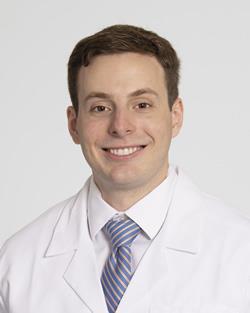
Student Spotlight: Matthew Schulgit
Tell us briefly about yourself.
Originally from Wisconsin, I attended college at the University of Wisconsin-Whitewater, majoring in biology and Spanish before coming to CCLCM. I am a few months into my fifth year at CCLCM and am looking forward to continuing my training in residency.
Why did you choose CCLCM?
CCLCM provides a unique curricular structure compared to other programs. I enjoyed my experience in research during my undergraduate education, so CCLCM’s incorporation of both dedicated research time and methodological instruction stood out. The innovative evaluation system is also unique as it fosters a collaborative learning environment and prioritizes self-reflection and personalized improvement. I also have other interests outside of academics, and CCLCM’s schedule provides time to explore them.
What is one of your favorite experiences at CCLCM thus far?
I’ve really enjoyed the early clinical experience that CCLCM provides. These clinics taught me skills that I have used throughout my rotations to develop my own style when taking care of patients. It has also introduced me to numerous faculty members who helped me develop my leadership skills, which I have been fortunate to use for patient advocacy.
Tell us about your research year project.
I worked with Sunil Srivastava, MD, and Sumit Sharma, MD (CCLCM ’09), to investigate how photos of the back of the retina (fundus photos) could be used to assess risk of heart attack and stroke. This central goal is based on research demonstrating that the retinal vasculature is among the most sensitive blood vessels in the body and responds to metabolic changes that may be implicated in cardiovascular disease. Current practice patterns recommend utilization of a risk calculator in primary care clinics that depends on blood tests, which can be difficult for many patients to obtain. We hope to utilize this non-invasive imaging to make assessment of cardiovascular health more accessible and personalized for patients.
What advice would you give to new CCLCM students?
Even with the advantages of the curriculum, there can be a lot of uncertainty when you first start. We are used to grades being an easy way to see how we are progressing through our education, so not having that safety net can be a bit of a shock. It’s important to trust your preparation and recognize that you still have those same study skills and knowledge base when you received grades, but now the focus is on mastery and depth of understanding instead of an upcoming midterm.
How do you manage stress?
I really enjoy sports and love watching the Brewers, Bucks and Packers as well as local teams like the Guardians and Cavaliers throughout the year! I also like spending time with my friends and going for walks at the great Metroparks system like Rocky River Reservation or the nearby Cuyahoga Valley National Park.
Tell us a fun fact about yourself.
I enjoy public service and have held positions ranging from student government to the city council!
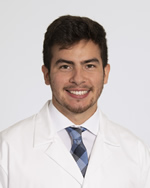
Student Spotlight: Alan Gordillo
Alan Gordillo
Tell us about yourself.
I completed my undergraduate studies at Ohio State University, majoring in neuroscience. I’m currently doing a four-week neurosurgery subinternship at the Hospital of the University of Pennsylvania. I chose this internship because U Penn has a large case volume, strong research foundation and robust pediatrics training through Children's Hospital of Philadelphia (CHOP).
Why did you choose CCLCM?
I have a longstanding fascination with science and a particular appreciation for surgery because of its hands-on nature and the immediate, visible impact on patient care. Initially, CCLCM was not on my list of potential medical schools because I doubted my chance to be accepted. What I love about CCLCM is the program’s integration with Cleveland Clinic, small class size, financial incentives and the physician-scientist training opportunities it offers.
Tell us about your research.
My thesis research involves glioblastoma, an aggressive and fast-growing brain tumor. The central research question examines how the timing of microglia depletion affects survival and whether sex influences this effect. I collaborated with Dr. Justin Lathia, whose lab specializes in glioblastoma research. Our findings indicate that early depletion of microglia leads to shorter survival, whereas depletion later in the disease prolongs survival equally across sexes.
What are you looking forward to in the future?
I aspire to become a brain tumor surgeon who integrates clinical practice with basic and translational research. My future plans include potentially running my own research lab or collaborating closely with other researchers and leveraging my surgical expertise to contribute to ongoing projects.
Any advice for incoming medical students?
I would advise new medical students to acknowledge and process their emotions in a healthy way during difficult or overwhelming times. Equally important is finding the things you can control in these situations and using them to navigate hardships effectively. For example, my dad passed away in March after a long battle with pancreatic cancer. That experience was incredibly frustrating, overwhelming and unfair. To cope, I let myself feel whatever initial emotions I had. It also helps to seek support from peers, mentors and friends to navigate hardships effectively.
What is a fun fact about you?
I once had a top ten all-time post on the Reddit subreddit Wall Street Bets, an online community focused on stock market discussions and investing.
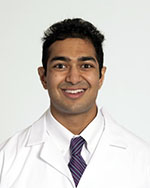
Student Spotlight: Nandan Kodur
Tell us about yourself.I was born in Ottawa, Canada, and moved to Michigan when I was 7 years old. I attended Michigan State University for college, where I majored in physiology, with minors in bioethics and philosophy. After graduating with my bachelor’s, I took a research gap year at the University of Michigan before enrolling at CCLCM in 2021. I’m in my final year here at CCLCM and will be graduating in 2026.
Why CCLCM?I love CCLCM’s approach to assessments. The lack of emphasis on testing means that we get more opportunities to engage in problem-based learning and to collaborate with each other. CCLCM also strongly values introspection as a learning tool, and I thoroughly enjoy receiving detailed feedback and engaging in reflective writing. These opportunities for self-directed growth are enhanced by small class sizes as well as faculty who are eager to serve as mentors.
What are some of your favorite CCLCM experiences?One of my favorite experiences at CCLCM has been being involved with Stethos, our school’s medical humanities journal. I served as an editor for the journal during my first couple of years of medical school and have since served as co-editor-in-chief during my third and fourth years. I’m constantly in awe of the creativity and artistic talent of folks in our community and beyond. Viewing medicine through a humanistic lens provides me with a refreshing reminder as to why I chose to enter this profession.
I also had the privilege of co-leading our school’s book club during my second year. Not only did I get to connect with my peers over books, but we also hosted amazing guests like Nobel Prize-winning physician-scientist Dr. Robert Lefkowitz, MD, who spoke about his career journey.
Tell us about your research year project.
I conducted my research here at Cleveland Clinic under Dr. Wilson Tang, MD, who is a cardiologist and heart failure specialist. My thesis focused on a condition known as heart failure with improved/recovered ejection fraction (HFimpEF), which refers to a state in which patients who have a heart with weak pumping function subsequently achieve improvement in such function, owing to medication and device therapies. While current clinical guidelines recommend that all patients with HFimpEF should continue to receive treatment indefinitely, there is growing awareness that a subset of these patients might be able to safely de-escalate from these therapies. It is currently difficult, however, to personalize treatment recommendations for patients with HFimpEF, as we lack robust clinical markers for risk stratification. My research sought to better characterize HFimpEF, including by identifying clinical markers that can risk stratify patients. Through conducting multiple retrospective cohort studies as well as a clinical study, we were indeed able to identify multiple clinical markers that can risk stratify patients with HFimpEF.
What advice would you give to new CCLCM students?
Trust the process. We have one of the most unique medical school curriculums in the country, which can initially be unfamiliar, especially since we don’t have exams to assess knowledge. However, through engaging in problem-based learning, obtaining early clinical exposure and receiving continual personalized feedback, you will have ample opportunities to learn and reinforce key clinical concepts that will prepare you for the USMLE exams and, more importantly, real-world patient care.
Tell us a fun fact about yourself.
My favorite show of all time is Avatar: The Last Airbender (the original, animated series—not the new live-action one). The show has a beautiful storyline and it’s funny, philosophical and enjoyable for people of all ages. I highly recommend giving it a watch!
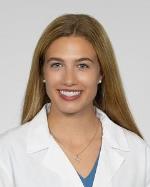
Student selected to attend 2024 AAMC RISE conference
Kudos to Gabriele (Gaby) Brown (’28) who was selected to attend the Association of American Medical Colleges’ RISE: Developing Future Leaders in Academic Medicine & Science conference in Washington, DC. The two-and-a-half-day leadership development conference is designed for students to develop tools to leverage their strengths, build teams, manage time and prioritize wellbeing. “RISE was an incredible personal growth opportunity and platform for relationship building among medical students throughout America. More than 50 medical schools were represented at the conference, and I now have a cohort of fellow M2 medical student leaders with whom I can share ideas and perspectives. “A major focus of the conference was on emotional intelligence skills and how to use our strengths to advocate for our communities. I am now committed to undertaking an ongoing inventory of my strengths in emotional intelligence and will share this experience and the skills I learned with my fellow students,” says Brown.

Members of CCLCM action group co-author book chapter
Congratulations to Kelly Bowen (’26); Jeffrey Shu (’26); Maeve Hopkins, MD, Assistant Professor of Ob/Gyn & Reproductive Biology; Tony Tizzano, MD, Clinical Assistant Professor of Surgery; and Jason Lambrese, MD, Assistant Professor of Psychiatry, who co-authored a chapter for this textbook, “Reimagining Medical Education: The Future of Health Equity and Social Justice, 1st Edition.” The team, members of the CCLCM Curriculum Review LGBTQ+ Action Group, prepared the chapter, titled “The ‘Add-A-Slide’ Approach: A Practical Solution for Integrating LGBTQ+ Health Topics into Undergraduate Medical Education.”

